Co-Curricular Activities (CCA) are a unique part of life at Pao School, and an integral part of its whole-person education philosophy. CCAs allow students to explore areas of personal interest, while cultivating skills that augment the specialised knowledge they have in these areas. In the Middle School, students can sign up for different activities each semester. This year there are four CCAs available directly related to News Media: Pao Paper, Pao TV, the Yearbook, and CCA Press. These have attracted an unprecedented level of interest from students.
The monthly journal Pao Paper, which is a way to show Middle School campus life through the eyes of students, is now in its fourth year of publication. The magazine covers a wide variety of topics of interest to students at the school, and has become a platform for them to learn about campus news, track campus hotspots, and showcase themselves.

In the weekly CCA, advisor teacher Sharpay Cao and Jacob Klein work together with the students to complete topic selection; division of labor; progress tracking; and collective proofreading. Sometimes, the advisor teachers provide relevant skills training. Interviews, writing, design and layout all need to be completed in the students' spare time, which tests their skills at time management. Yet despite this, "Pao Paper is still very popular," said Advisor Teacher Ms. Sharpay Cao. "Students who want to join must submit their sample work, and pass a selection process."
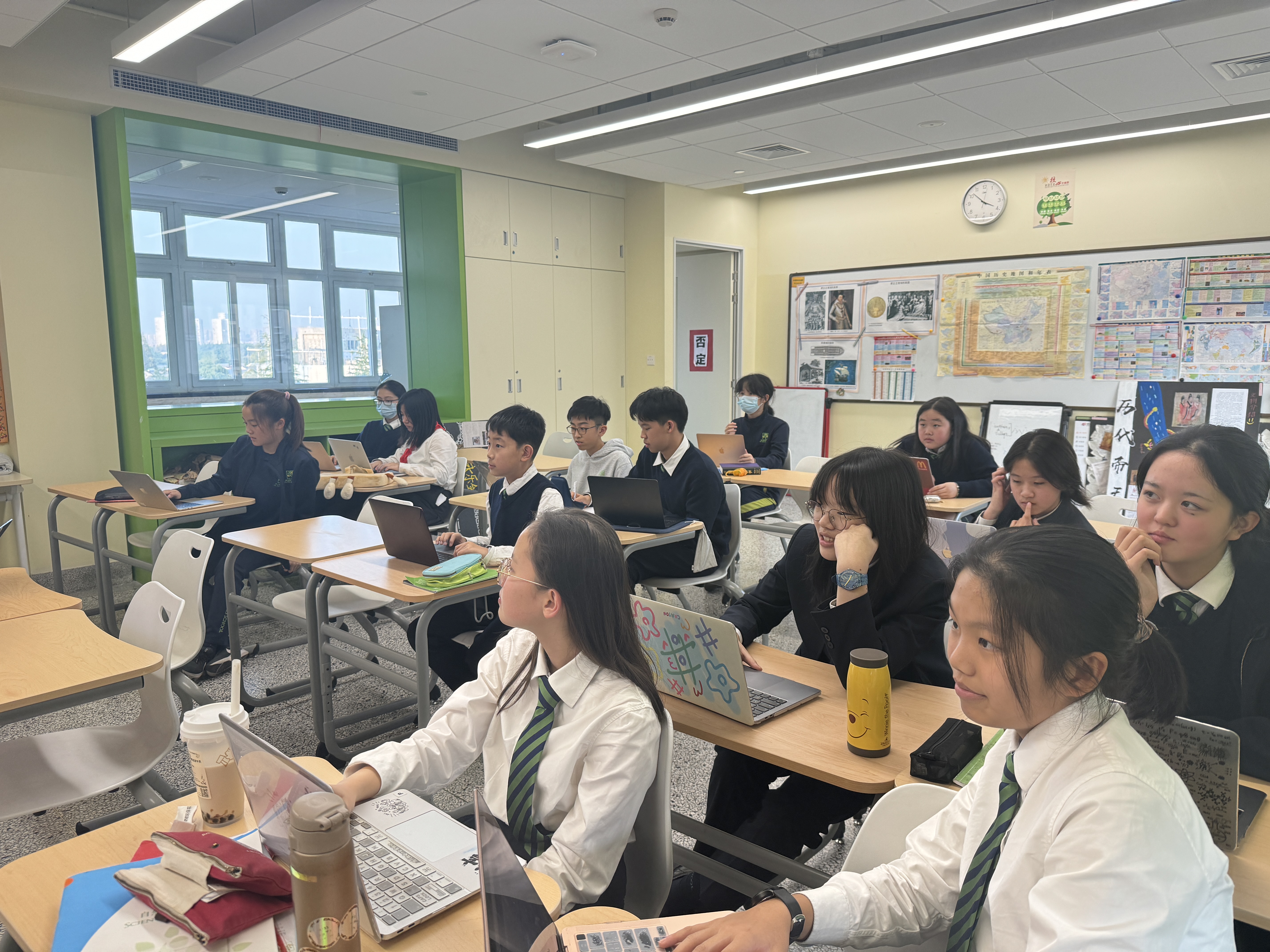
Each issue of ‘Pao Paper’ contains several regular sections. Reports on-campus activities which mainly follow hot topics are jointly decided by the editorial team through collective discussion. Interviews with teachers expose students to interesting and unusual sides of teachers of various subjects, whereas ‘Growing a Pomelo Tree’ is a section for student submissions, consisting of poems, essays, photographs, paintings, and other forms of work.
In this regard, Editor-in-charge Penny (Y8) explained: "The original intention of this section was to encourage other Pao School students outside the editorial team to actively participate in writing, diligently integrating their thoughts into the context of their lives and putting them on paper. It is also a way to promote a closer relationship between students and Pao Paper. As long as they are willing, anyone can participate in the production of Pao Paper.
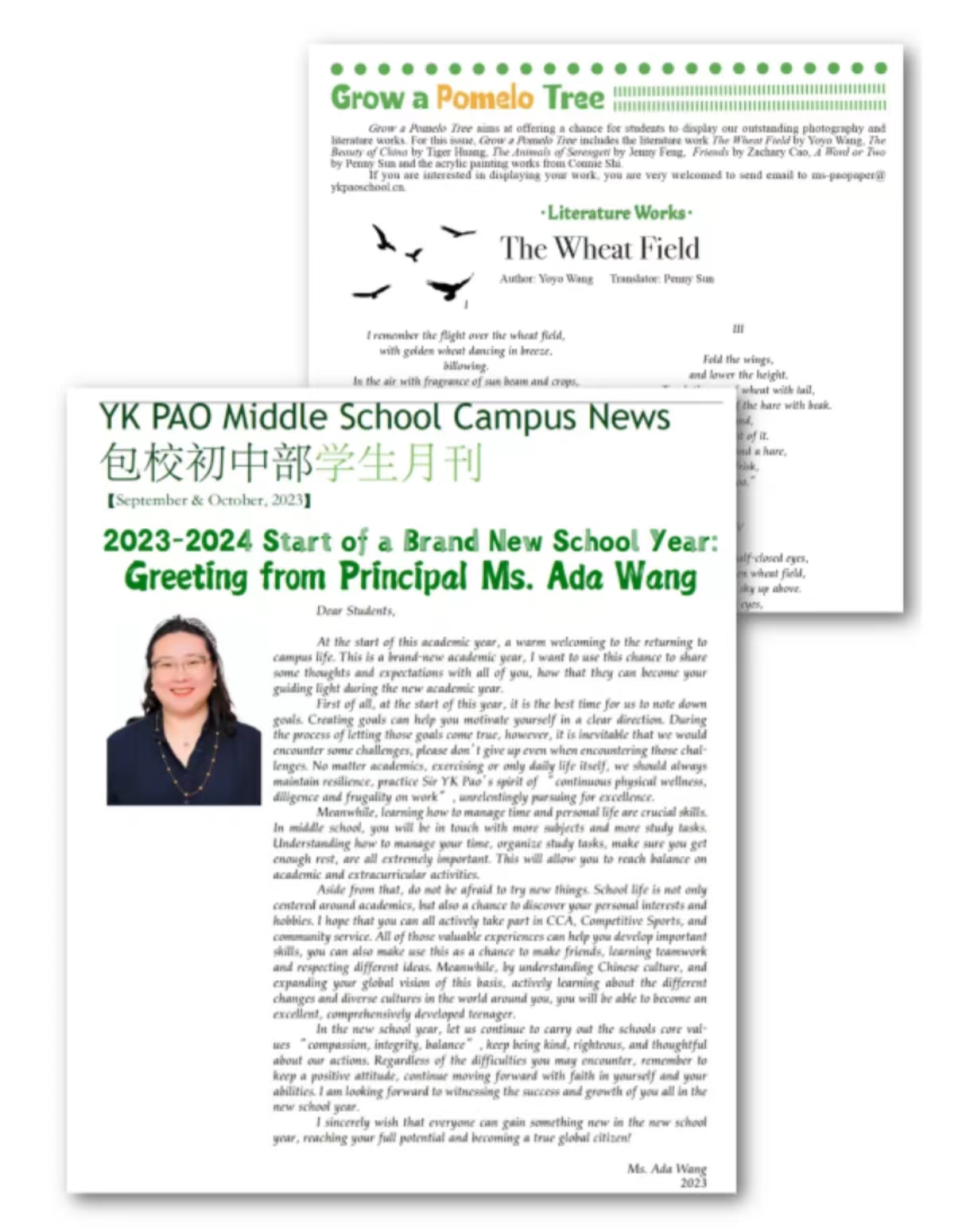
Chief Editor Yoyo (Y8) explained that the editorial team of Pao Paper is mainly divided between copy editors, responsible for interviewing, writing reports, translating, proofreading, and such tasks; and layout editors, mainly responsible for page layout. After the first draft of the paper is completed, all the editors take part in proofreading. The most common problem encountered during this process is the uncertainty of the publication schedule, due to adjustments in the progress of the various sections.
As Deputy Chief Editor Connie (Y8) explained: "The layout editors need to arrange the content, completed by all members, within a short period of time, and sometimes there are some ‘hiccups’, for example, uncertainty about an interview time might lead to the disruption of the relevant arrangements, which then squeezes the time available for the layout, and so forth.” Fortunately, by drawing upon their extensive experience, the team have been able to overcome such problems, but they are still searching for better solutions.
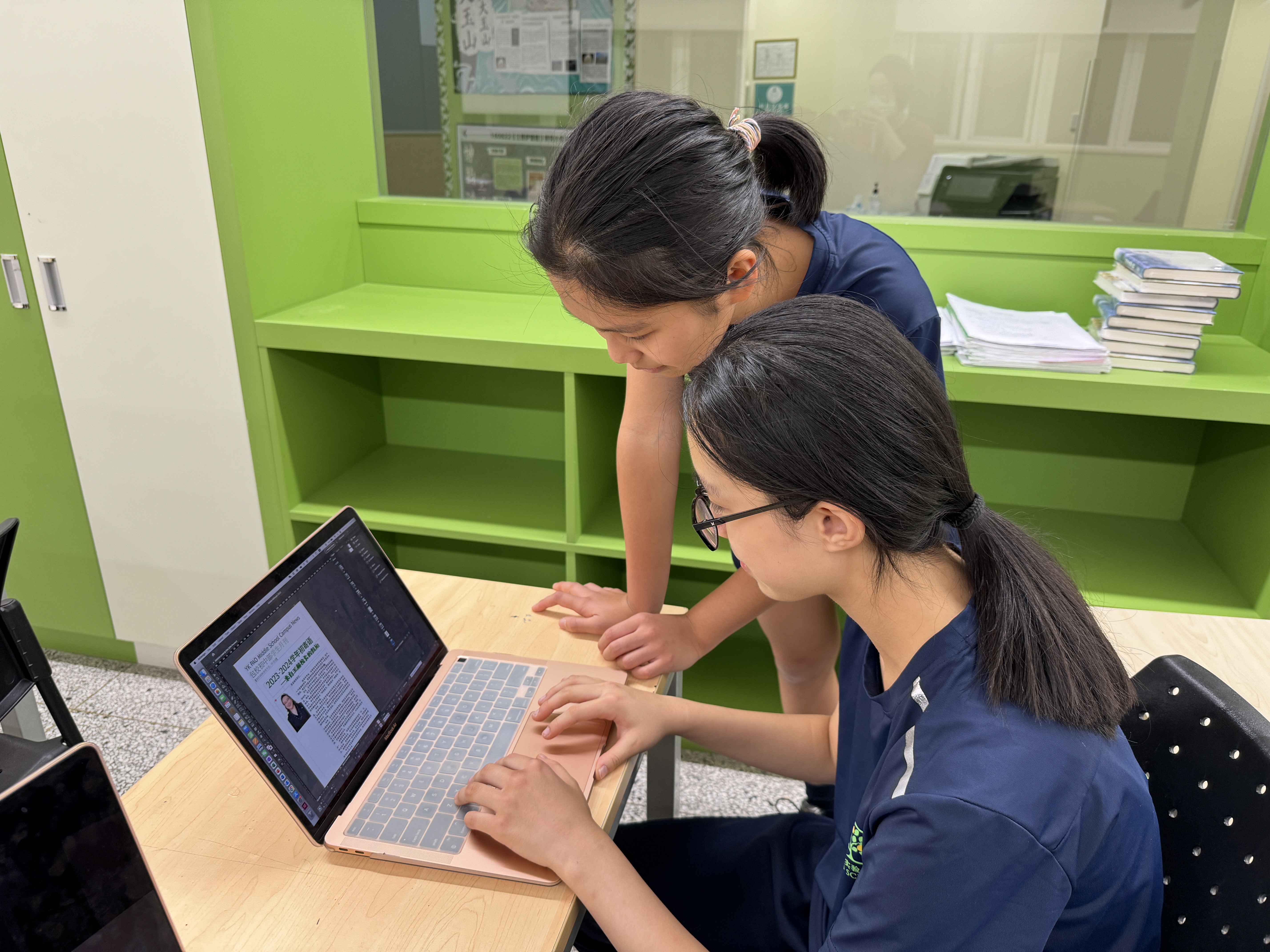
In the first issue of the new academic year, one section focuses on the ‘new students’ at the Hongqiao Campus. Whether they have come from the YK Pao Primary School or have just joined Pao School, all are full of curiosity about the Hongqiao Campus and hope to integrate themselves into the community as quickly as possible. To further this, the editorial team interviewed a few students from each year group on various aspects of campus life.
The following content is an excerpt from the ‘YK PAO Middle School Campus News, Sep. & Oct. 2023-24 School Year’.
Q:What is the biggest change from Primary School to Middle School?
Hugo (Y6): The biggest change is that there is a different classroom for each class, and there are only five minutes between them. I must get things and get to the classroom quickly, and sometimes I can’t find stationery and textbooks. It is sometimes necessary to ask a teacher the way. It’s a difficult moment because the teachers don’t let us run or even walk fast. So it can be difficult to get to the classroom on time. Still, I’m sure that in a few weeks, I’ll be familiar with the classrooms, so I won’t have to ask for directions from teachers or run down the hallway in a panic every day.
Purple, Audrey (Y6): Middle school is very different from primary school. The most important thing is to strengthen self-management. During the first two weeks, my time management was terrible. I was busy shuttling between exams and homework, leaving no time for myself. But then I started adjusting. I managed to ‘catch the falling stone’ and made time for myself by planning my schedule. With each day being regulated like this, I feel both happy and fulfilled. I hope I can spend my three years in middle school like this.
Q:How do you feel since joining Pao School?
Annie (Y7): I felt the help of my classmates and teachers was significant. For example, my classmates explained codes of conduct and policies in the school, helped me solve some problems when using computers, and took me to various classrooms that I was not familiar with. The teachers also answered my questions very patiently, which has enabled me to absorb the lessons in class and gradually make progress.
Sophie (Y8): I find the classes in Pao School very lively, with every student having unique ideas which they are keen to share and discuss. Also, the weekly assembly for each year group conveys important information. There are many activities to choose from that increase students involvement in school decisions. I really like the structure of the auditorium, with its large screen, rotating spotlights, and seating around the stage. It enables the audience to watch the performance from many angles, while the open space in front of the stage provides plenty of room for drama performances, while integrating the audience.
Q:What are your expectations for the new school year in a new environment?
Leo (Y7): Firstly, I hope to fully integrate into the community and interact more with my classmates. Secondly, I want to get involved in fun and meaningful activities. Thirdly, I hope for a good grade and to get off to a good start. Finally, I want to find a few friends who can be called ‘childhood friends’, who will help with my transformation and adaptation process to the school.
Max (Y8): I have already achieved my three hopes for the new campus, including eating delicious meals, building a social circle as soon as possible, and experiencing advanced teaching software and hardware. Now I hope to participate in different kinds of CCAs, learn more, and make more friends in this process.
Sophie (Y8): I hope to integrate into my classes better and actively answer the teacher’s questions. Also, I wish to supplement my knowledge and vocabulary in English science and English humanities. I believe even small goals, if persisted in, will accumulate, and bring a far-reaching impact.
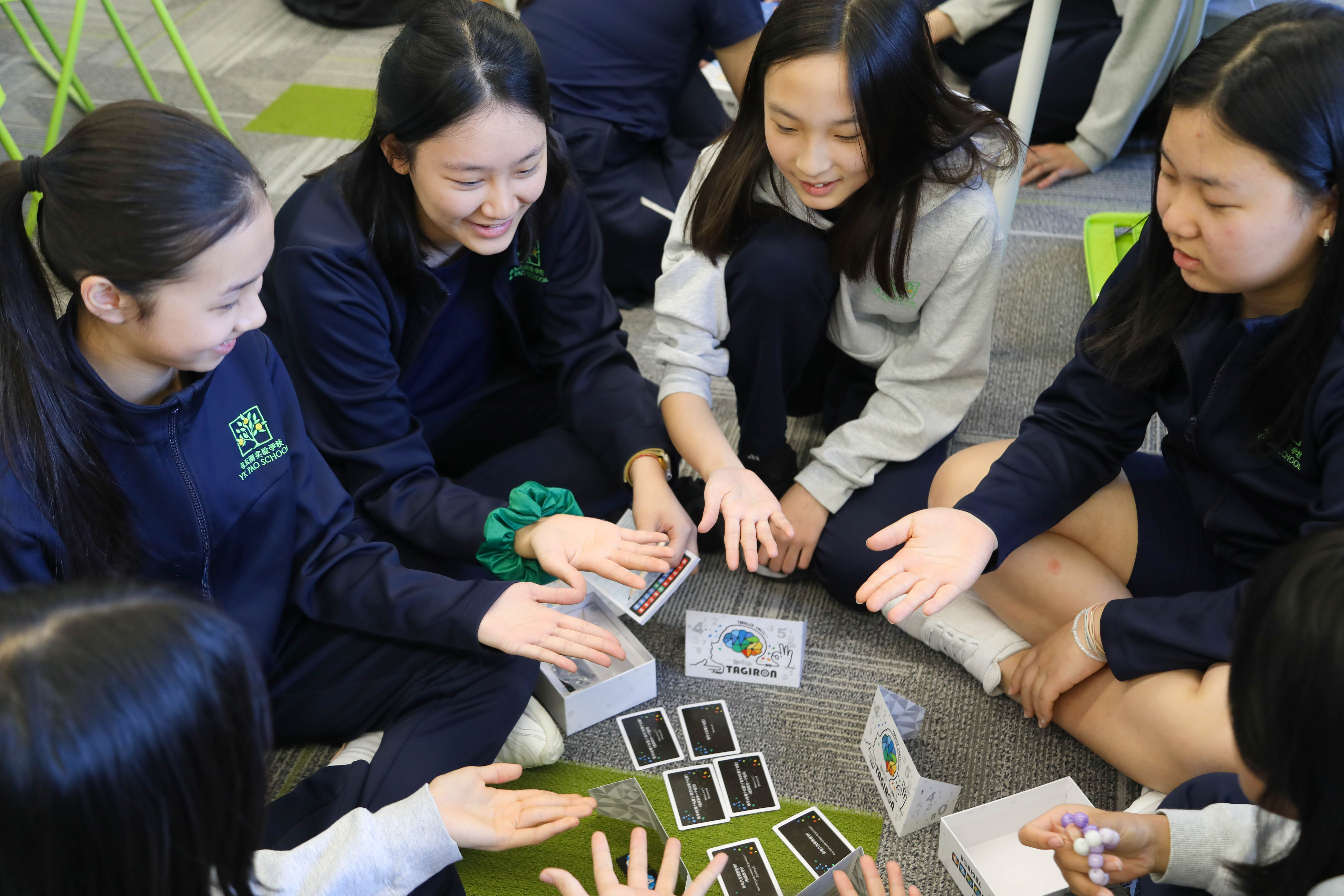
In addition, the Community Service CCA communicated some suggestions from the school counsellors, Ms. Tina Wu, and Ms. Laurel Li, who explored two scenarios and discussed how to deal with socializing problems in the new semester.
I’m a new student at Pao School. I saw several students talking to each other, and I wanted to join them, but I didn’t know how to blend into their conversation, so what could I do?
Counsellor: If new students feel they need time to adapt to the community, the first step is to find out more about the school, whether by talking with classmates or chatting privately to teachers. For example, a classmate could be contacted during recess, and then asked about aspects of the school that seem confusing, or interesting. It can also help to join clubs and organizations, such as sports teams, or the student council. These groups provide valuable social experiences, and could even introduce you to find your soulmate! It’s also worth finding other new students facing the same situation as you, and talking to them about your feelings. Never set a high standard for socialization, always maintain a positive attitude, and allow yourself time to reach out for opportunities.
Beside thinking about the problem from the point of view of new students, we could also examine it from the point of view of existing students at the school. We can ask how to help new students feel more welcome, and more comfortable socializing, because this should be a two-way process.
Student Art Works
"To me, art isn't just about expression; it's about sending a message, and I aim to shed light on urgent environmental issues that many might be unaware of, such as marine pollution, animal poaching, and deforestation. "
——Connie (Y8)
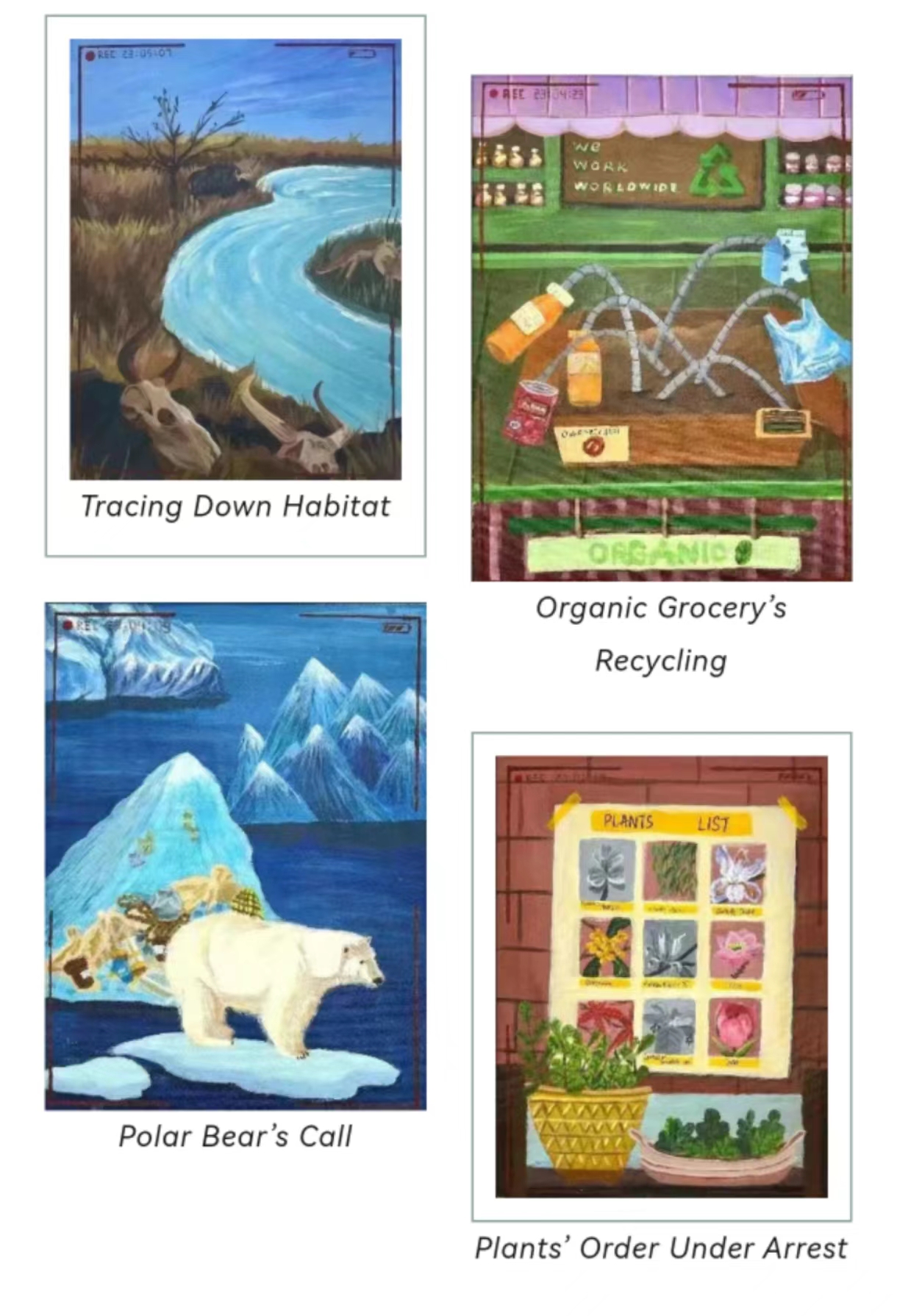
Pao Paper Editorial Team
Chief Editor: Yoyo
Deputy Chief Editor: Connie
Editors: Angela, Audrey, Hugo, Jennifer, Jenny, Melody, Penny, Purple, Queenie, Tiger
Layout: Bella, Eason
Advisor: Sharpay Cao, Jacob Klein